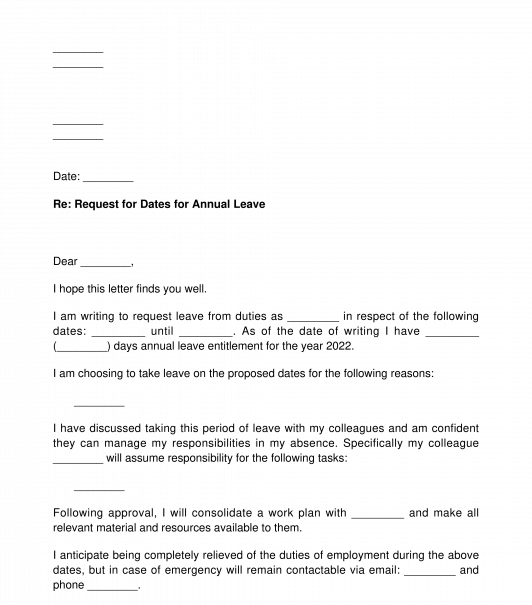 13/11/2025
13/11/2025

Answer a few questions and your document is created automatically.

Your document is ready! You will receive it in Word and PDF formats. You will be able to modify it.

 13/11/2025
13/11/2025
 Word and PDF
Word and PDF
 1 page
1 page
This is a Letter Requesting Annual Leave from employment.
All employees, whether full or part time, are legally entitled to leave from work. This is prescribed under the Organisation of Working Time Act, which grants full time workers 20 days annual leave (not inclusive of public holidays) and part time workers 8% of their total hours as holidays. These parameters are statutory minimums, and many employers award their employees enhanced leave entitlements under their Contracts of Employment.
Notwithstanding the statutory and contractual right to take leave from work, there are certain conditions attached. Namely, employees must coordinate their annual leave with employers. This involves giving notice of proposed leave (notice periods are set out in the Contract of Employment or Employee Handbook), consulting with supervisors or managers to ensure that the proposed leave dates are conducive to workflow, and finding a way to manage the employee's workload while they are away from work. All parties must endeavour to act reasonably and flexibly, and cooperate to ensure minimal disturbance to the business while on leave. This letter is designed to help employees manage their annual leave in a professional and cooperative manner.
This letter allows the user to firstly specify the dates for which they would like leave from work. This is contextualised by recalling the number of days leave entitlement the employee enjoys and how many days they have used so far this year. This letter provides space for the employee to explain why they want to take leave during those proposed dates, and why they think it is an appropriate time to be away from the business. Employers want happy employees, and so if the employee makes clear why taking leave at this time is important to them, the employer is more likely to grant the request. At the same time, there is always some adjustment required when an employee is absent from work, there are tasks to be reassigned and responsibilities that must be shared between a smaller group of staff. It is always advised not to seek leave during a particularly hectic period for a business. By explaining why the employee thinks the proposed period of leave is appropriate it can help assuage the employer's concerns.
In a similar vein, this letter includes a section allowing the employee to describe how their responsibilities and tasks will be handled in their absence. It is best to nominate a colleague as a point of contact for the employer who performs similar functions and is competent to take over the departing employee's responsibilities. Of course, provided that colleague agrees. Finally, the letter includes methods of communication through which the employee can be contacted while on leave.
How to Use this Document
This document can be used by any employee who would like to request leave from work. In all cases, it is best to put requests in writing and to keep a record of correspondences. Taking leave is a legal right, and while there has to be some flexibility on behalf of the employee in light of business demands, requests for leave should only be refused where reasonable and necessary. It is advised that employees consult their Contract of Employment to see how much notice before taking leave the employer requests they provide. It is important to give colleagues ample time to prepare for their absence and the earlier the request is made the more likely it is to be awarded.
Applicable Law
There is no specific law governing the manner in which an employee should request leave from their employer. However, there are certain standards of professionalism and best practice which this letter incorporates. As stated, the right to take annual leave is both contractual and statutory. As such the Organisation of Working Time Act, and the rules of Irish Contract Law apply in a general sense.
How to modify the template
You fill out a form. The document is created before your eyes as you respond to the questions.
At the end, you receive it in Word and PDF formats. You can modify it and reuse it.
Letter Requesting Annual Leave - sample template
Country: Ireland